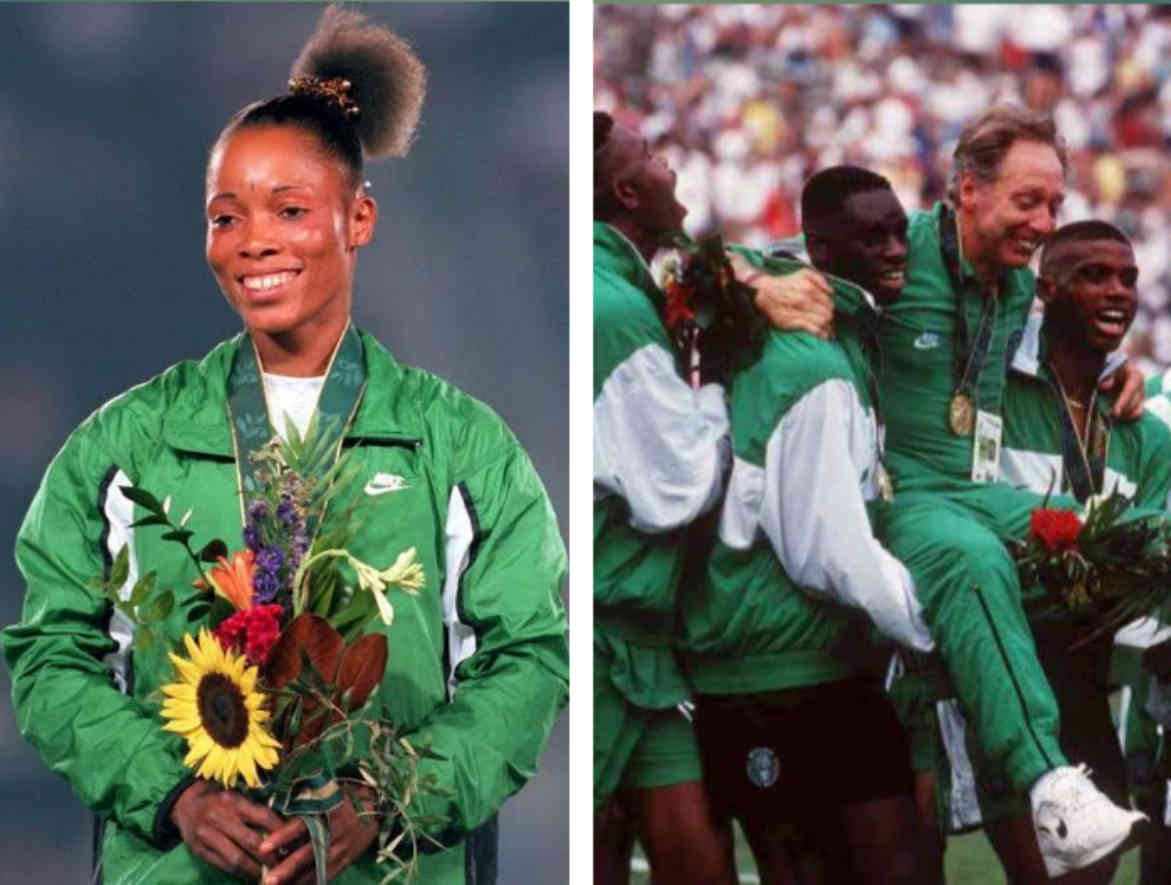Nigeria made history at the 1996 Olympic Games in Atlanta, delivering two gold medals that cemented the nation’s place on the world stage. Chioma Ajunwa soared into the record books with her victory in the women’s long jump, Nigeria’s first-ever Olympic gold in athletics.
Just days later, the Under-23 men’s football team, christened the “Dream Team,” stunned the world by defeating football giants to clinch gold.
Nearly 30 years on, the echoes of Atlanta still resonate. Those nights of triumph remain benchmarks for Nigerian sport, moments that defined a generation.
But what became of the heroes of ’96? Where are they now, and how have their lives unfolded beyond their Olympic glory?
This feature retraces the journey of Nigeria’s golden athletes, from their unforgettable triumphs to the paths they’ve taken since.
Table of Contents
Chioma Ajunwa: Nigeria’s First Individual Olympic Gold Medalist
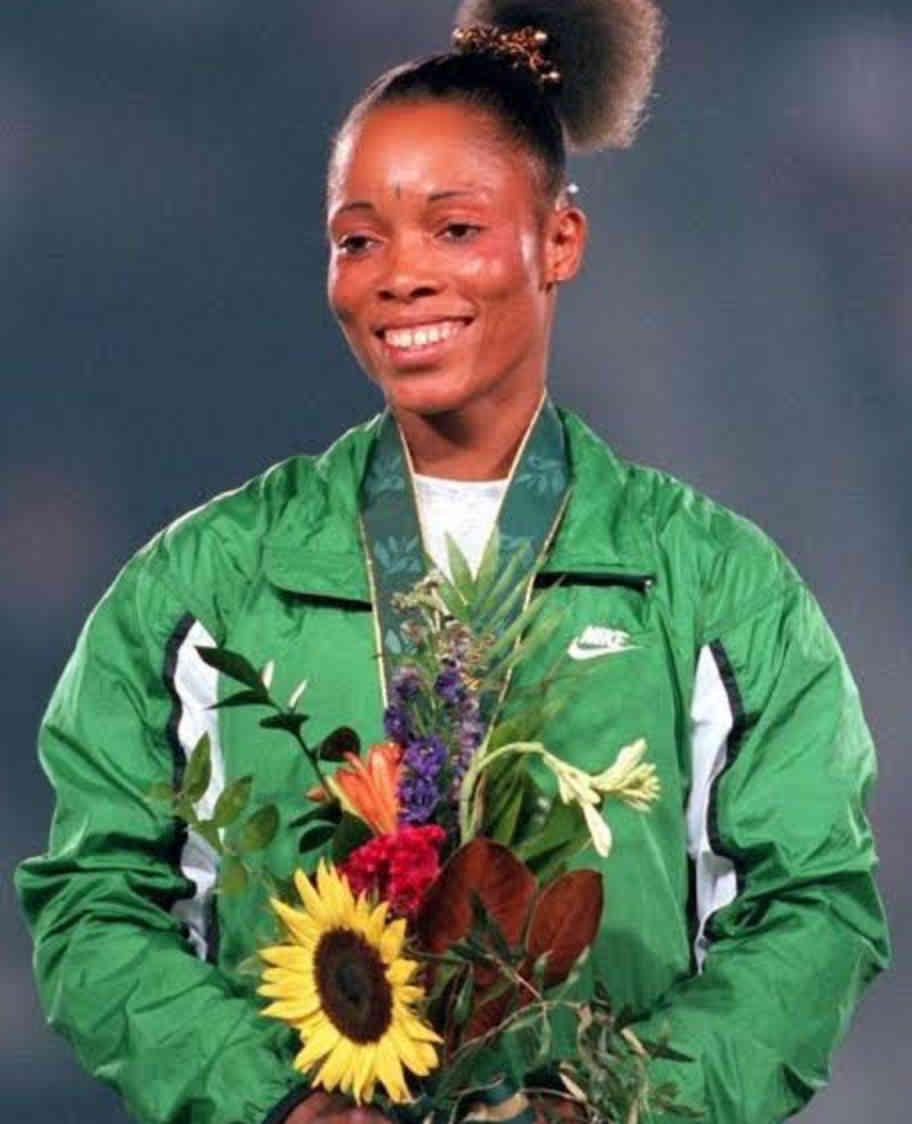
When Chioma Ajunwa soared 7.12 meters on her very first attempt at the Atlanta Games, she did more than win gold; she rewrote history.
She became the first Black African woman to claim an Olympic gold medal in a field event, and remains Nigeria’s only individual Olympic gold medalist to this day.
Her path to glory, however, was far from smooth. Years before Atlanta, Ajunwa’s career was derailed by a four-year ban following a failed drug test, one she always insisted was unjust.
Many believed her best days were behind her. Yet Ajunwa returned with remarkable resilience, silencing her doubters and etching her name into Olympic folklore with a performance for the ages.
Life After The Olympics
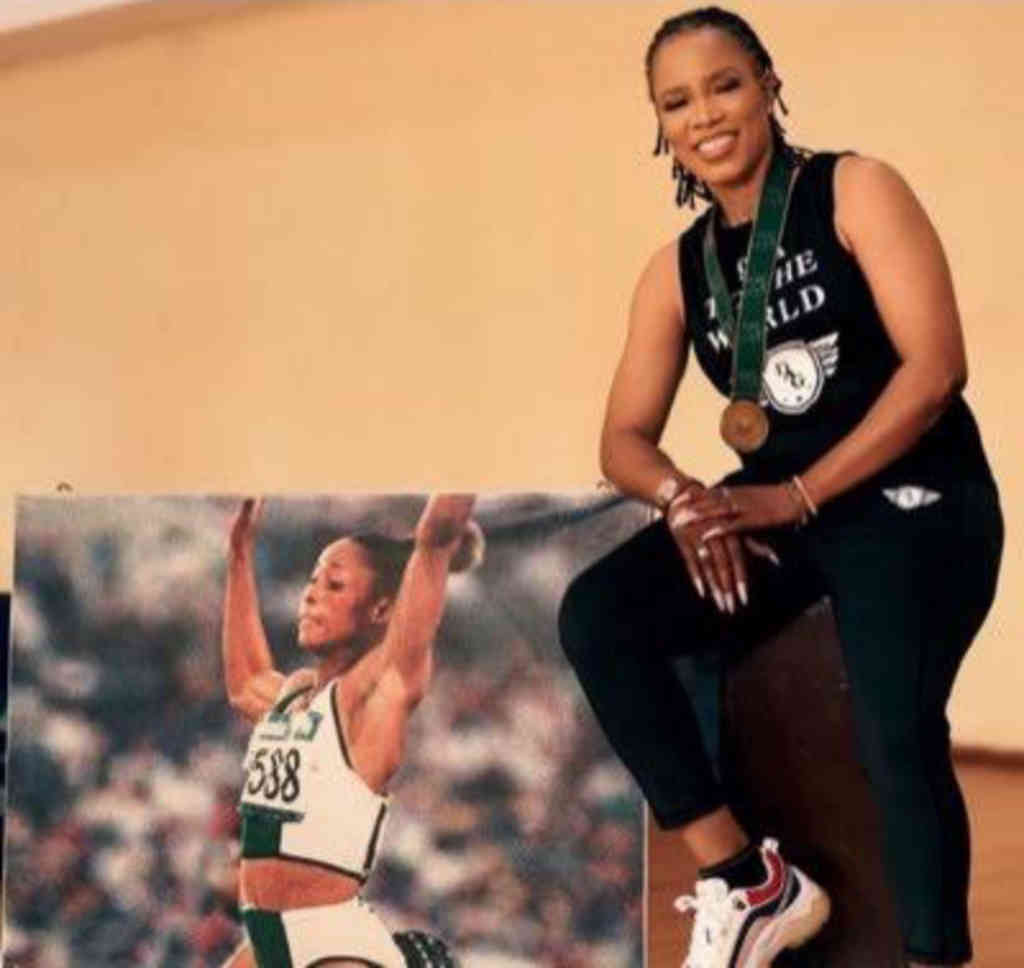
After her Olympic triumph, Ajunwa was celebrated nationwide. She was conferred with the Member of the Order of the Niger (MON) and later honoured with a traditional chieftaincy title.
She also received cash rewards and gifts, though many argue the recognition was inconsistent and not sustained over the years until more recent times. Today, Chioma Ajunwa serves as an Assistant Commissioner of Police in Nigeria. Beyond her law enforcement career, she has remained a passionate advocate for sports development.
Through the Chioma Ajunwa Foundation, she mentors and supports young athletes, helping them pursue athletics while continuing their education. In 2018, she launched an Under-16 athletics championship in Abia State to discover and nurture fresh talent.
Ajunwa’s journey endures as a symbol of resilience and determination, a reminder that setbacks, when met with courage and faith, can be transformed into lasting triumphs.
The Football Dream Team: Africa’s Trailblazers
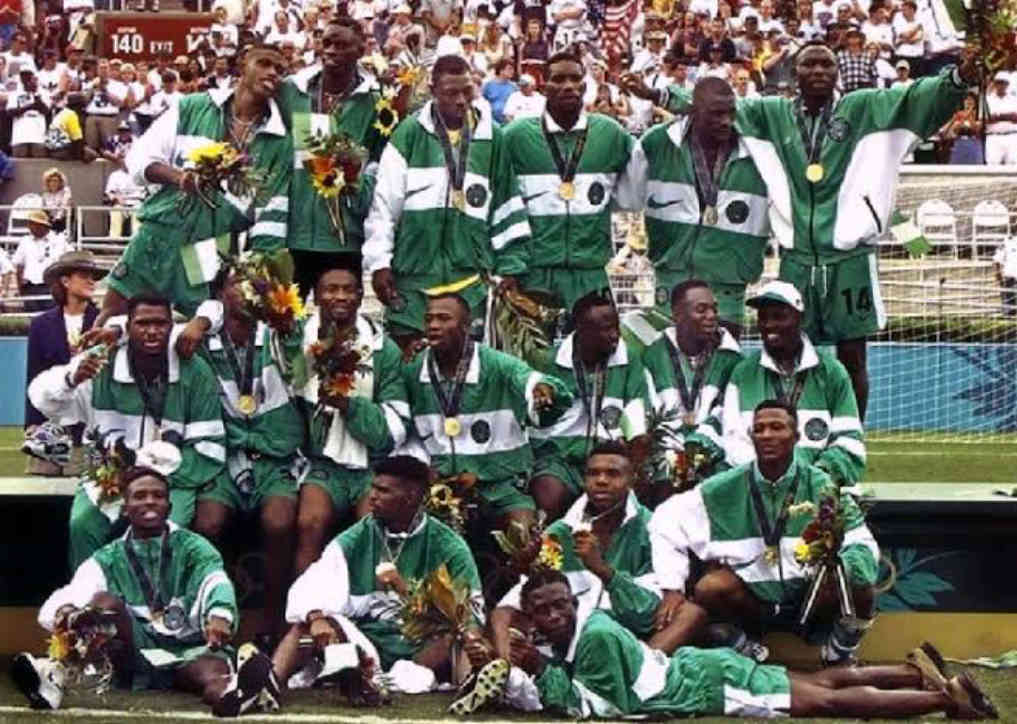
Nigeria’s second gold medal in Atlanta came from the men’s football tournament, where the Under-23 side stunned the world. Under the guidance of coach Jo Bonfrère, the “Dream Team” defeated global giants Brazil and Argentina en route to an unforgettable triumph.
The victory was historic, the first time an African nation had ever won Olympic gold in football. It transformed perceptions of African football, opening doors and commanding new respect for African players on the global stage.
In the years that followed, the heroes of 1996 took different paths. Some went on to greater success in their football careers, while others struggled, their golden moment in Atlanta remaining the highlight of their sporting lives.
Victor Ikpeba
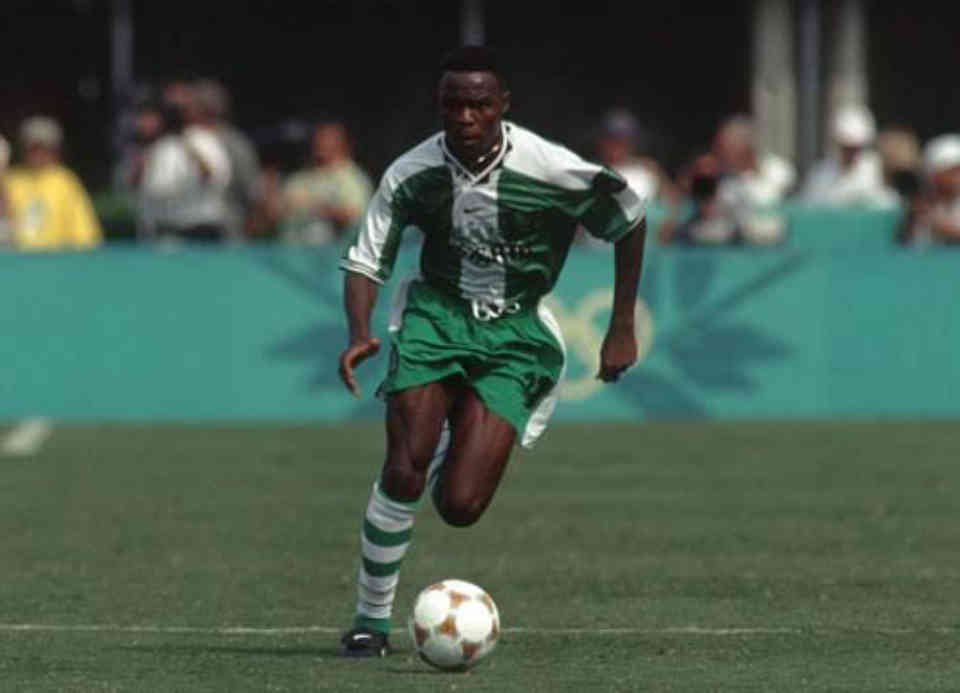
Victor Ikpeba was a key impact substitute at the Atlanta Olympics, famously scoring off the bench against Brazil. His club career flourished soon after; he won Ligue 1 with Monaco in 1997 and was crowned African Footballer of the Year the same year.
Ikpeba enjoyed notable spells in Europe, including with Borussia Dortmund and Real Betis, cementing his reputation as one of Nigeria’s finest exports during his peak. He retired in 2005 and has since transitioned into punditry, providing expert analysis on both club and international football.
Career Highlights
| Category | Details |
|---|---|
| Full Name | Victor Nosa Ikpeba |
| Date of Birth | 12 June 1973 |
| Birthplace | Benin City, Nigeria |
| Playing Position | Forward |
| Club / Period | Appearances / Goals | Achievements |
|---|---|---|
| ACB Lagos (1989) | — | Spotted during 1989 FIFA U-17 World Championship |
| RFC Liège (1989–1993) | 79 apps / 27 goals | Belgian Cup winner (1990); Ebony Shoe (1993) |
| AS Monaco (1993–1999) | 170 apps / 55 goals | Ligue 1 champion (1996–97); African Footballer of the Year (1997) |
| Borussia Dortmund (1999–2002) | 30 apps / 3 goals | Played in Bundesliga & UEFA competitions |
| Real Betis (loan, 2001–2002) | 3 apps / 0 goals | Brief spell in La Liga |
| Al-Ittihad Tripoli (2002–2003) | 26 apps / 13 goals | Won Libyan Premier League (2002–03) |
| Charleroi (2004) | 15 apps / 5 goals | Short return to Belgium |
| Al-Sadd (2005) | — | Final professional club |
| Years | Caps / Goals | Highlights |
|---|---|---|
| 1992–2002 | 31 caps / 7 goals |
|
| Year | Award |
|---|---|
| 1993 | Ebony Shoe (Best African player in Belgian League) |
| 1997 | African Footballer of the Year |
Social Media:
Instagram – victor_ikpeba
Twitter/X – V_Ikpeba
Uche Okechukwu
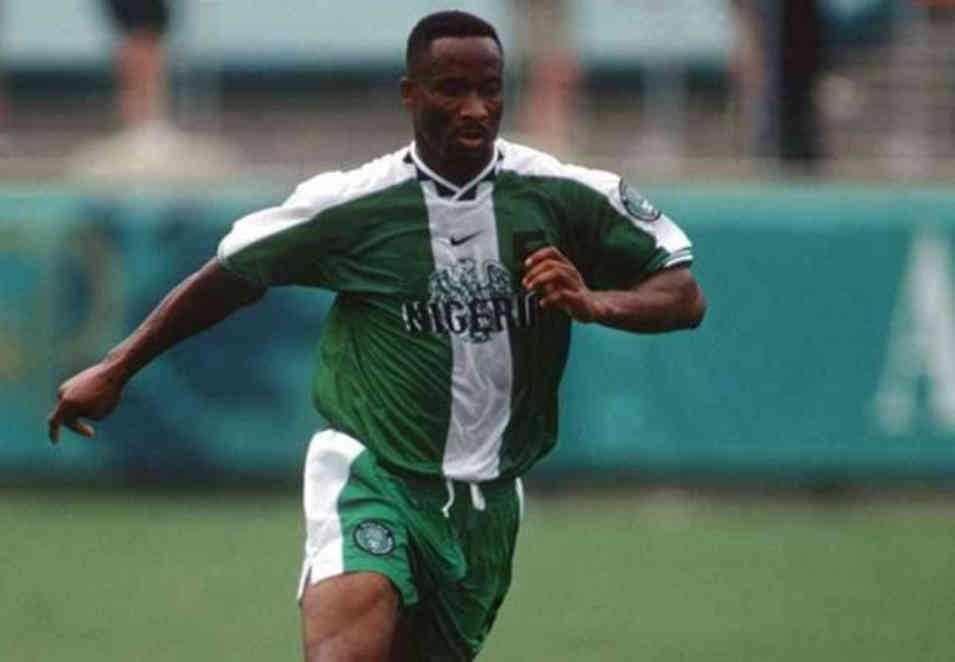
A stalwart in defence, Uche Okechukwu cemented his legacy at Fenerbahçe, where he spent nearly a decade and even obtained Turkish citizenship under the name Deniz Uygar. He was among the trailblazers who opened doors for future generations of Nigerians in the Turkish Super Lig, becoming a fan favourite during his long stay.
Okechukwu later returned home to finish his career in the Nigerian league, retiring in the mid-2000s. His leadership and consistency at the back were vital to Nigeria’s Olympic triumph, securing his place as one of the cornerstones of that historic squad.
Career Highlights
| Category | Details |
|---|---|
| Full name | Uchechukwu Alozie Okechukwu |
| Date of birth | 27 September 1967 |
| Birthplace | Lagos, Nigeria |
| Position | Central defender |
| Club / Period | Appearances / Goals | Achievements / Notes |
|---|---|---|
| Flash Flamingoes (1987) | — | Early club in Nigeria |
| Iwuanyanwu Nationale (1988–1990) | — | Nigeria Premier League winner (1988, 1989) |
| Brøndby IF (1990–1993) | ≈ 61 apps / 10 goals | Danish title winner (1990, 1991); Brøndby Player of the Year (1992) |
| Fenerbahçe (1993–2002) | ≈ 191 apps / 19 goals | Süper Lig champion (1995–96, 2000–01); long-serving central defender |
| İstanbulspor (2002–2006) | ≈ 75 apps / 8 goals | Continued career in Turkey |
| Ocean Boys (2007–2008) | — | Return to Nigeria |
| Bayelsa United (2008–2009) | — | Final club before retirement |
| Years | Caps / Goals | Highlights |
|---|---|---|
| 1990–1998 | ≈ 47 caps / 3 goals | AFCON winner (1994); Olympic gold (1996); World Cups 1994 & 1998 |
| Award / Honour | Year / Details |
|---|---|
| Brøndby Player of the Year | 1992 |
| Nigeria Premier League titles (with Iwuanyanwu Nationale) | 1988, 1989 |
Social Media:
Instagram – uche_of_lagos
Tijani Babangida
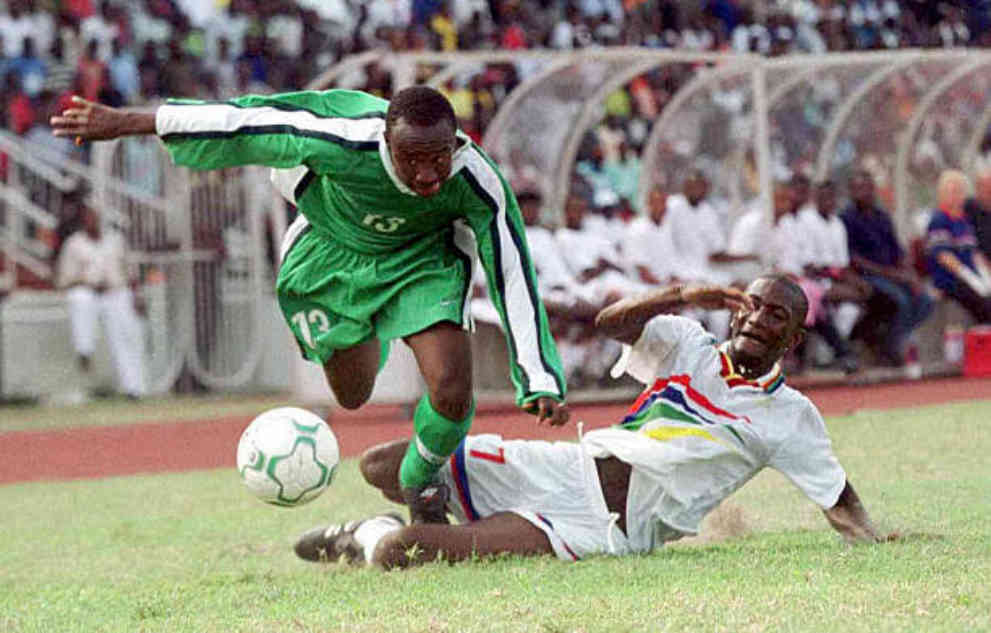
Renowned for his blistering pace, Tijani Babangida rose to prominence at Ajax following Nigeria’s Olympic triumph. His career, however, was cut short, as he retired in 2004 at just 28 due to injuries and other challenges.
Despite the early end, Babangida left a lasting mark, particularly in the Netherlands, where he enjoyed the peak of his career.
After hanging up his boots, he transitioned into football management and agency work, carving out a new path within the sport while supporting the next generation of players.
Career Highlights
| Category | Details |
|---|---|
| Full name | Tijani Babangida |
| Date of birth | 25 September 1973 |
| Birthplace | Kaduna, Nigeria |
| Position | Winger |
| Club / Period | Appearances / Goals | Achievements / Notes |
|---|---|---|
| VVV-Venlo (loan, 1991–1993) | 34 / 19 | Helped win Eerste Divisie (promotion) |
| Roda JC (1991–1996) | 78 / 26 | Top scorer for the club in some seasons |
| Ajax (1996–2003) | 77 / 20 | Eredivisie & KNVB Cup double (1997–98); KNVB Cup 1998–99 |
| Gençlerbirliği (loan, 2000–01) | 12 / 2 | Turkish Cup winner |
| Vitesse (loan, 2001–02) | 14 / 1 | Eredivisie regular |
| Al-Ittihad (loan, 2002–03) | 5 / 0 | Short spell in Saudi Arabia |
| Changchun Yatai (2003–2004) | 29 / 8 | Final club before retirement |
| Years | Caps / Goals | Highlights |
|---|---|---|
| 1994–2004 | 36 / 5 | Olympic gold medalist (1996); Played at 1998 FIFA World Cup (scored vs Denmark); Africa Cup of Nations appearances |
| Honour | Year / Details |
|---|---|
| Olympic Gold Medal | 1996 – with Nigeria U-23 |
| Eredivisie Champion | 1997–98 – with Ajax |
| KNVB Cup Winner | 1997–98, 1998–99 – with Ajax |
| Turkish Cup Winner | 2000–01 – with Gençlerbirliği |
Social Media:
Instagram – tijani13
Wilson Oruma
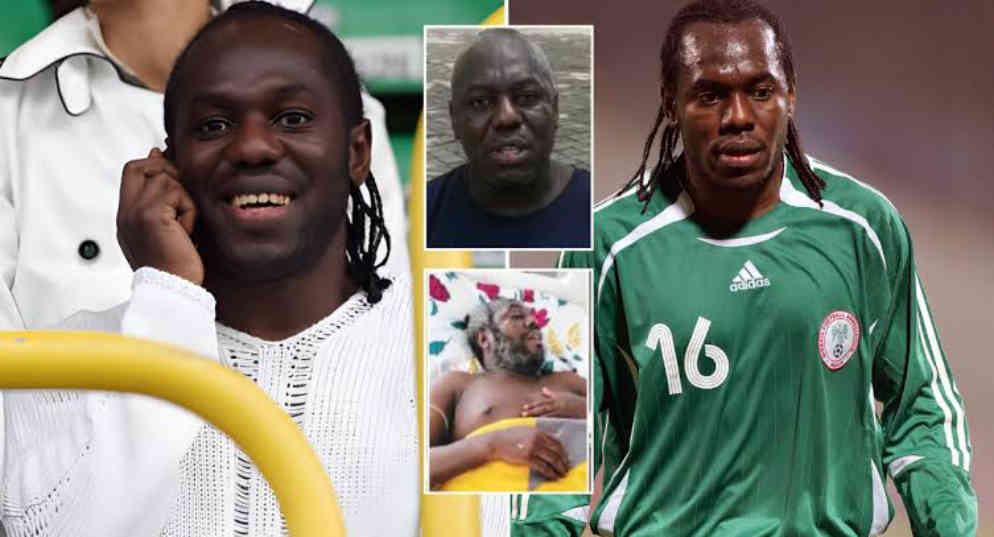
Although his role in the Olympic squad was more subdued, Wilson Oruma went on to enjoy a solid European career with stints at Lens, Marseille, Sochaux, and Guingamp before retiring in 2010.
His post-football journey, however, was marked by hardship. Oruma fell victim to a fraudulent oil-block deal, losing between ₦1.2 and ₦2 billion, which plunged him into depression and emotional struggles.
With time and support from the NFF and close allies, he recovered and has since embraced a quieter life in Lagos. Today, he remains connected to football, informally guiding and mentoring aspiring young players.
Career Highlights
| Category | Details |
|---|---|
| Full name | Wilson Oruma |
| Date of birth | 30 December 1976 |
| Birthplace | Warri, Delta State, Nigeria |
| Position | Midfielder |
| Club / Period | Appearances / Goals | Achievements / Notes |
|---|---|---|
| Bendel Insurance (until 1994) | — | Started career in Nigeria |
| RC Lens (1994–1998) | 42 / 2 | Ligue 1 Champion 1997–98 |
| Nancy (loan, 1996–1997) | 22 / 0 | Loan spell from Lens |
| Samsunspor (1998–1999) | 21 / 4 | First move outside France |
| Nîmes (1999–2000) | 25 / 2 | Returned to France |
| Servette (2000–2002) | 49 / 12 | Strong goal-scoring form |
| Sochaux (2002–2005) | 77 / 6 | Coupe de la Ligue winner 2004 |
| Marseille (2005–2008) | 56 / 3 | UEFA Intertoto Cup winner 2005 |
| Guingamp (2008–2009) | 24 / 5 | Coupe de France winner 2009 |
| AO Kavala (2009–2010) | 23 / 0 | Final club before retirement |
| Years | Caps / Goals | Highlights |
|---|---|---|
| 1995–2006 | 19 / 3 | • Captained Nigeria U-17 to 1993 FIFA U-17 World Cup win (top scorer, 6 goals) • Olympic Gold Medal 1996 (Nigeria U-23) • Played at 1998 FIFA World Cup, scored vs Paraguay • Bronze medals at AFCON 2002 & 2006 |
| Honour | Year / Details |
|---|---|
| FIFA U-17 World Cup | 1993 – Winner & Top scorer (6 goals) |
| Olympic Gold Medal | 1996 – with Nigeria U-23 |
| Ligue 1 Champion | 1997–98 – with RC Lens |
| Coupe de la Ligue | 2004 – with Sochaux |
| Coupe de France | 2009 – with Guingamp |
Mobi Oparaku
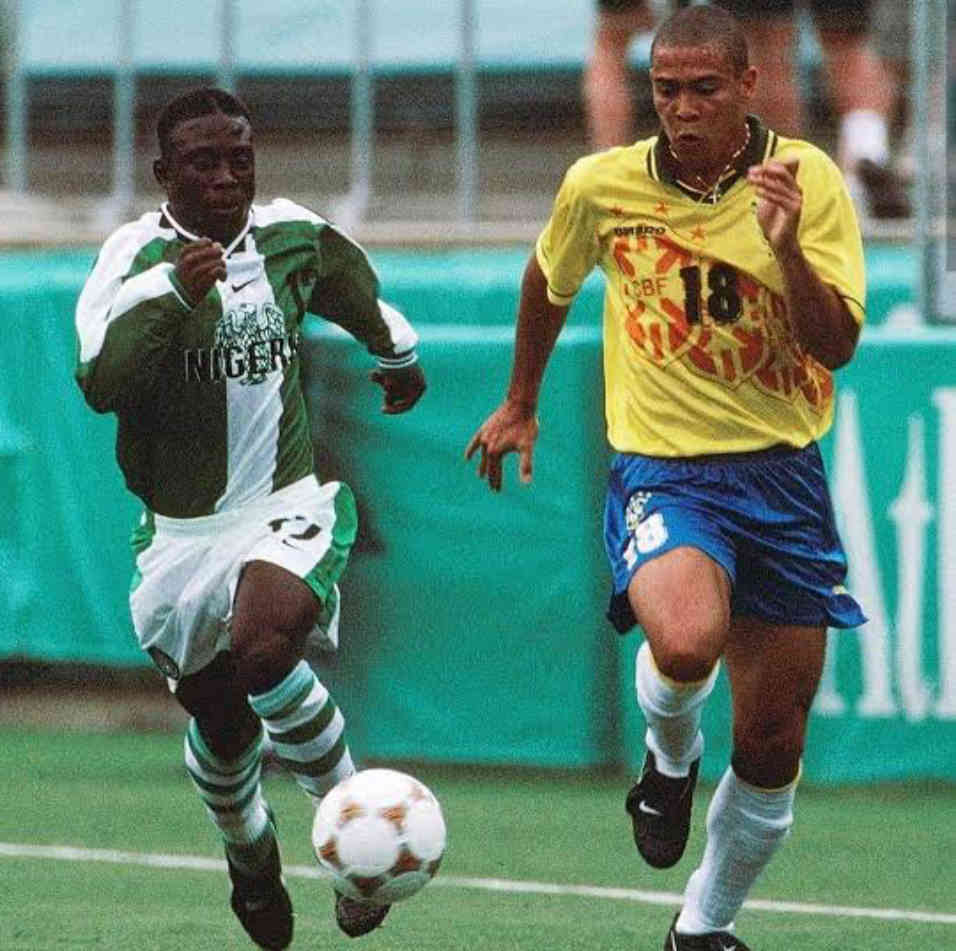
Mobi Oparaku was Nigeria’s first-choice right-back during the historic 1996 Olympic triumph. After spells in Belgium and stints with lower-tier European clubs, he eventually returned home to continue his career.
He featured for Enyimba in the Nigerian league before officially retiring from active football around 2010.
Though not always in the spotlight, Oparaku’s role in the Dream Team’s success remains a vital part of Nigeria’s Olympic legacy.
Career Highlights
| Category | Details |
|---|---|
| Full Name | Mobi Patrick Oparaku |
| Date of birth | 1 December 1976 |
| Birthplace | Owerri, Nigeria |
| Position | Defender / Right-back |
| Club / Period | Appearances / Goals | Notes / Achievements |
|---|---|---|
| Iwuanyanwo Nationale (1993–1995) | — | Early career in Nigeria |
| Anderlecht (1995) | — | Moved to Belgium top club |
| Turnhout (1995–1997) | 30 / 2 | Regular in second-division Belgian football |
| Capellen (1997–1999) | 25 / 5 | Defender with some scoring contributions |
| El Paso Patriots (2000) | 13 / 3 | One season in US |
| Connecticut Wolves (2001) | 23 / 1 | Another US stint |
| Rivoli United (2001–2005) | — | Long spell in Jamaica |
| Gateway F.C. (2005–2008) | — | Return to Nigeria |
| Enyimba International (2008–2010) | — | Final club before retirement |
| Years | Appearances / Goals | Highlights |
|---|---|---|
| 1993 | 6 / 0 (U-17) | FIFA U-17 World Championship |
| 1996 (U-23 / Olympics) | 6 / 0 | Gold Medal at Atlanta 1996 Olympic Games |
| 1996–2003 (Senior Nigeria) | 8 / 0 | Part of France 1998 World Cup squad |
| Honour / Note | Year / Details |
|---|---|
| Olympic Gold Medal | 1996 – with Nigeria U-23 dream team | 0 |
| 1998 FIFA World Cup | Participated in France 1998 | 1 |
Teslim Fatusi
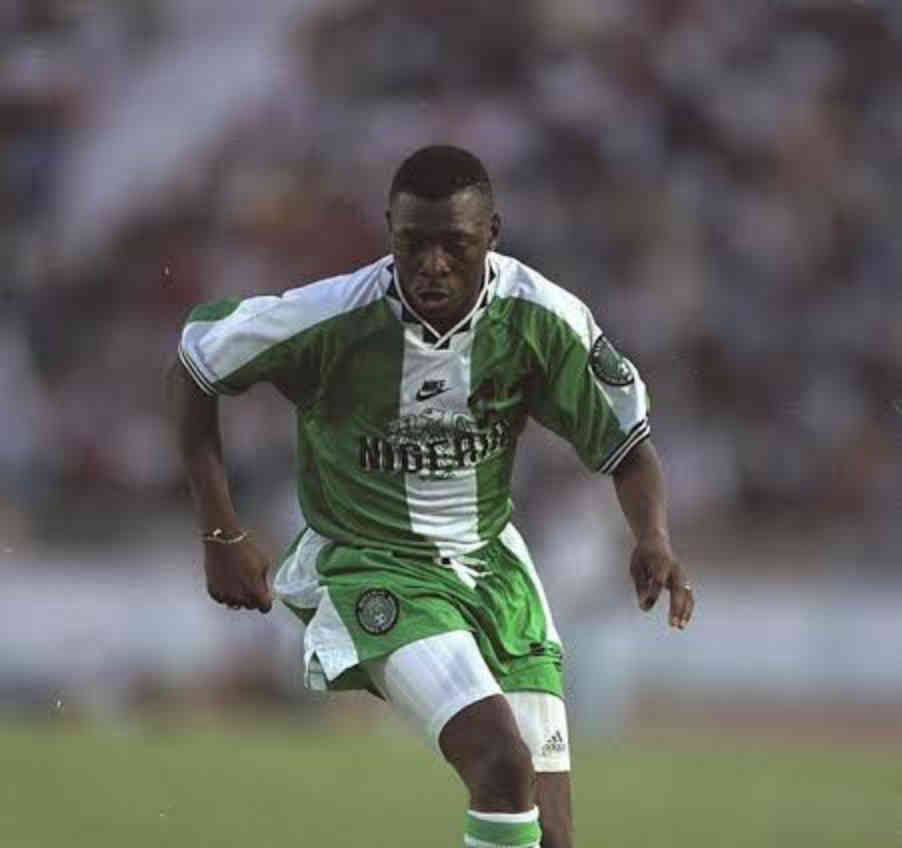
Teslim Fatusi was the youngest member of Nigeria’s Dream Team at the 1996 Olympics. His career took him across Africa, Europe, Asia, and the U.S., featuring for 17 clubs over 24 years.
A true journeyman, Fatusi rarely stayed long at one club but still managed to carve out a respectable professional career. His last known stint was with Miami Dade in 2016.
Today, he resides in the United States, where he has transitioned into business and enjoys a private life with his family.
Career Highlights
| Full Name | Teslim Babatunde Fatusi |
|---|---|
| Date of Birth | 17 September 1977 |
| Birthplace | Surulere, Lagos, Nigeria |
| Position | Winger / Right Midfielder |
| Club / Period | Notes |
|---|---|
| Stationery Stores (1992–1993) | Started senior career in Nigeria |
| ASEC Mimosas (1993–1994) | Played in Côte d’Ivoire |
| Servette (1994–1995) | Swiss Super League |
| Pécs (1995) | Hungary |
| Ferencváros (1995–1996) | Won Hungarian league |
| Espérance (1997–1998) | Tunisia |
| Mamelodi Sundowns (1998–2000) | Won South African league titles |
| Polonia Warszawa (2001) | Played in Poland |
| Magdeburg & Sachsen Leipzig (2002–2004) | Germany |
| Al-Khaleej (2004–2005) | Saudi Arabia |
| Shooting Stars (2005–2006) | Returned to Nigeria |
| Vietnam Clubs (2007–2008) | Thể Công & Tây Ninh |
| Upward Stars FC (2015–2016) | USA |
| Miami Dade FC (2016– ) | USA |
| Years | Highlights |
|---|---|
| 1996 (U-23) | Olympic Gold Medal at Atlanta 1996 |
| 1996–1999 (Senior Nigeria) | 4 caps, 1 goal — scored on debut vs Czech Republic |
| Achievement | Year |
|---|---|
| Olympic Gold Medal | 1996 (Atlanta) |
| Hungarian League Champion | 1995–96 with Ferencváros |
| Tunisian Championship | 1997–98 with Espérance |
| South African League Titles | 1998–99 & 1999–2000 with Mamelodi Sundowns |
Elvis Chizoba Acha
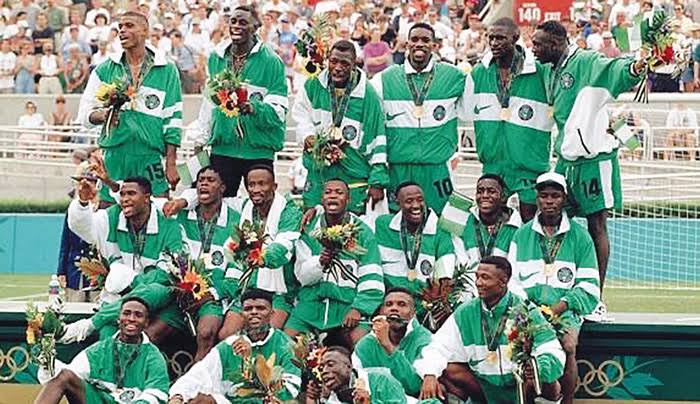
Elvis Chizoba Acha was part of Nigeria’s gold-winning squad in Atlanta, but unlike many of his teammates, he faded from the spotlight after the tournament.
Among all members of the Dream Team, Acha remains the most enigmatic, with little to no publicly available information about his career or life after the Olympics.
What path he chose following that historic moment remains unclear, leaving his story one of the few untold chapters of Nigeria’s golden generation.
Career Highlights
| Category | Details |
|---|---|
| Full name | Elvis Chizoba Acha |
| National Team | Nigeria Olympic Team (1996, Atlanta) — Gold Medalist |
More career details (club career, position, appearances, other honours) not found / to be added when available.
Kanu Nwankwo
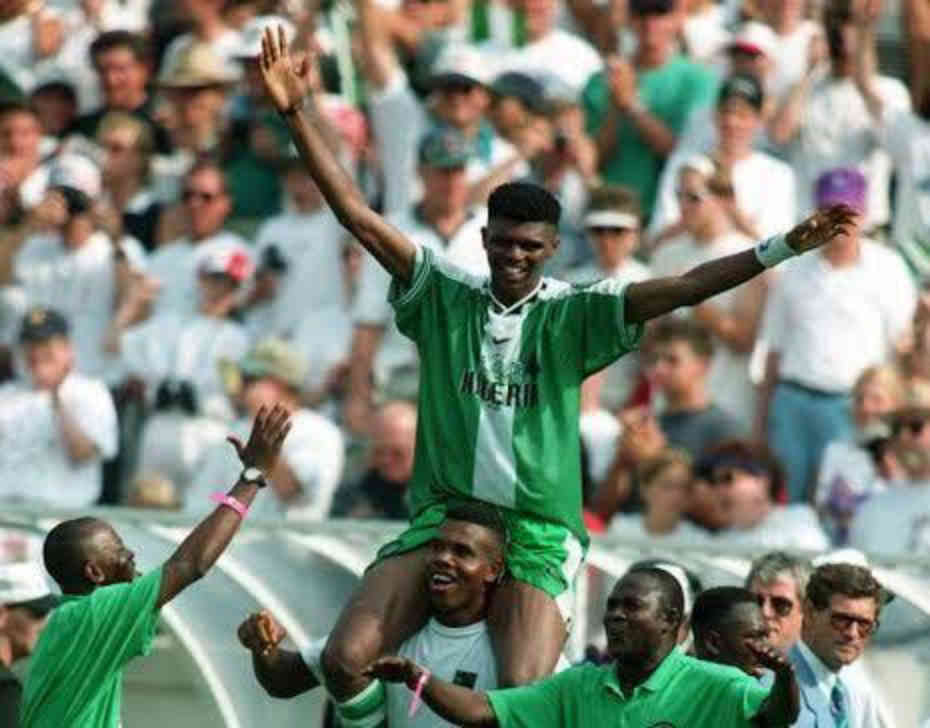
Kanu Nwankwo was the standout figure of Nigeria’s Dream Team, remembered for his dramatic brace against Brazil in the semi-final that propelled the team to the Olympic final.
Following Atlanta, he enjoyed a glittering club career with Ajax, Inter Milan, and Arsenal, where he lifted Premier League and FA Cup titles and became one of Africa’s most celebrated footballers.
Since retiring, Kanu has focused on philanthropy. Through the Kanu Heart Foundation, he has helped provide life-saving surgeries for children with heart conditions.
He remains active in sports and business, serving as a prominent voice in Nigerian football and currently holding a leadership role with NPFL giants Enyimba Football Club.
Career Highlights
| Full Name | Nwankwo Kanu |
|---|---|
| Date of Birth | 1 August 1976 |
| Birthplace | Owerri, Imo State, Nigeria |
| Position | Forward |
| Club / Period | Highlights |
|---|---|
| Iwuanyanwu Nationale (1992–1993) | Started professional career in Nigeria |
| Ajax (1993–1996) | Won 1995 UEFA Champions League & 3 Eredivisie titles |
| Inter Milan (1996–1999) | Overcame heart surgery; won UEFA Cup 1998 |
| Arsenal (1999–2004) | Part of the 2003–04 “Invincibles”; 2 Premier League & 2 FA Cups |
| West Bromwich Albion (2004–2006) | 53 appearances, 7 goals |
| Portsmouth (2006–2012) | FA Cup winner 2008; scored in semi-final and final |
| Team / Years | Highlights |
|---|---|
| Nigeria U-17 (1993) | Won FIFA U-17 World Championship |
| Nigeria U-23 (1996) | Olympic Gold Medal at Atlanta 1996; scored twice vs Brazil in semi-final |
| Nigeria Senior Team (1994–2011) | 86 caps, 12 goals; played in 3 FIFA World Cups |
| Honour | Year |
|---|---|
| FIFA U-17 World Cup | 1993 |
| Olympic Gold Medal | 1996 |
| UEFA Champions League (Ajax) | 1995 |
| Premier League (Arsenal) | 2002, 2004 |
| FA Cup | 2002, 2003 (Arsenal); 2008 (Portsmouth) |
| African Footballer of the Year | 1996, 1999 |
Social Media:
Instagram – kingkanu4
Twitter/X – papilokanu
Jay-Jay Okocha
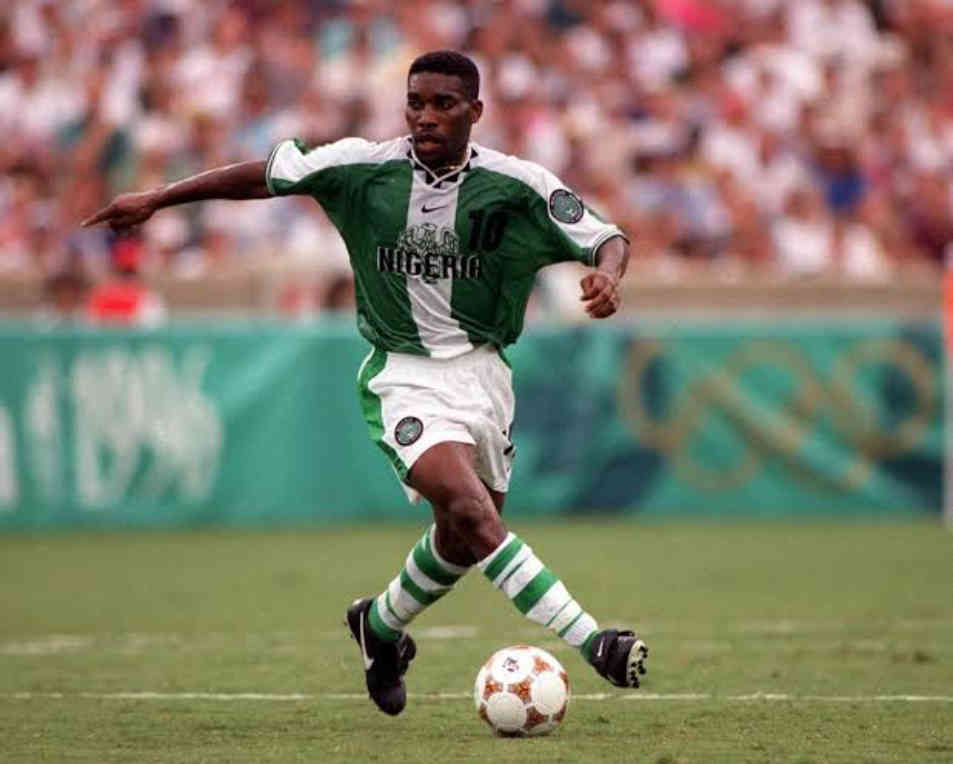
Austin “Jay-Jay” Okocha’s name is synonymous with flair, creativity, and entertainment. At Atlanta 1996, he dazzled with his trademark dribbling, unlocking defences and creating chances for the Dream Team.
After the Olympics, he built a distinguished career with Paris Saint-Germain, Fenerbahçe, and Bolton Wanderers, where his skill and charisma made him a Premier League cult hero.
Since retiring in 2008, Okocha has turned to business, media punditry, and ambassadorial roles, maintaining his influence within the game.
Despite his brilliance, Okocha never won the CAF African Footballer of the Year award, a fact still regarded as one of African football’s great injustices.
Career Highlights
| Full Name | Augustine Azuka “Jay-Jay” Okocha |
|---|---|
| Date of Birth | 14 August 1973 |
| Birthplace | Enugu, Nigeria |
| Position | Attacking Midfielder |
| Years | Caps / Goals | Highlights |
|---|---|---|
| 1993–2006 | 73 / 14 | Africa Cup of Nations winner (1994) Olympic Gold Medal (1996) Played in 3 FIFA World Cups |
| Club / Years | Highlights |
|---|---|
| Enugu Rangers | Started professional career in Nigeria |
| Eintracht Frankfurt (1992–1996) | Scored famous solo goal vs Karlsruhe; Bundesliga star |
| Fenerbahçe (1996–1998) | 30 goals in 62 matches; became fan favorite |
| Paris Saint-Germain (1998–2002) | Won Trophée des Champions (1998) and Intertoto Cup (2001) |
| Bolton Wanderers (2002–2006) | Club captain; led team to League Cup Final; cult hero in Premier League |
| Qatar SC (2006–2007) | Played one season in Qatar Stars League |
| Hull City (2007–2008) | Helped Hull City earn promotion to the Premier League |
| Honour | Year |
|---|---|
| Africa Cup of Nations Winner | 1994 |
| Olympic Gold Medal | 1996 |
| Trophée des Champions (PSG) | 1998 |
| UEFA Intertoto Cup (PSG) | 2001 |
| Premier League Player of the Month | November 2003 |
| Africa Cup of Nations Best Player | 2004 |
| Bolton Wanderers Player of the Year | 2005 |
Social Media:
Twitter/X – IAmOkocha
Instagram – official_jj10
Emmanuel Amuneke
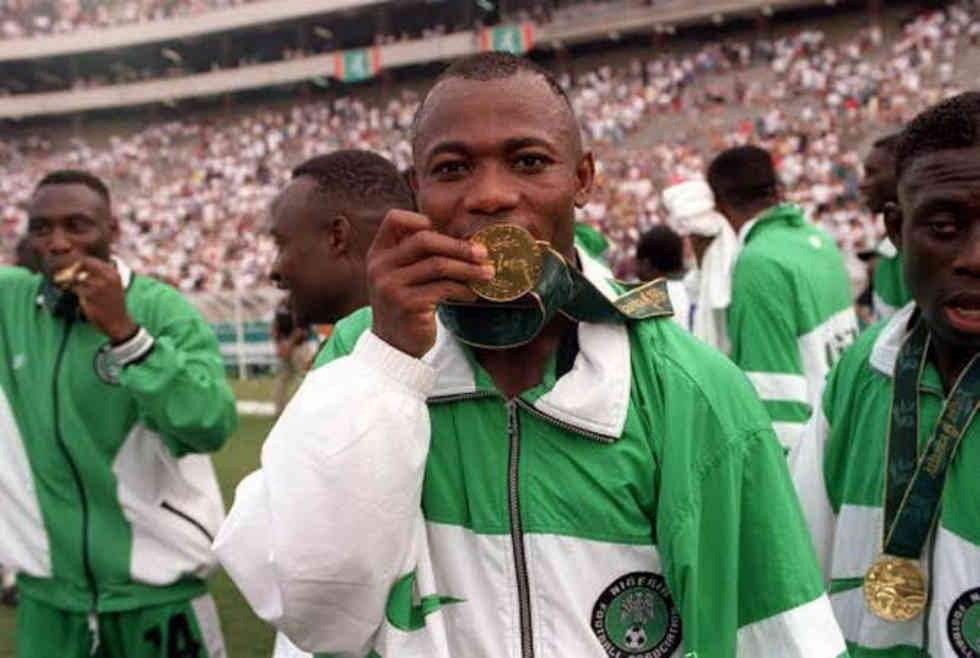
Emmanuel Amuneke was one of the Dream Team’s over-age players and already a household name, having starred at the 1994 Africa Cup of Nations and World Cup.
After Atlanta, he secured a move to Barcelona, but persistent injuries curtailed his playing career. Undeterred, Amuneke transitioned into coaching and famously led Nigeria’s U-17 team to FIFA U-17 World Cup glory in 2015.
He has since managed both clubs and national teams, including a stint with Tanzania, and remains deeply involved in football development across Africa.
Career Highlights
| Full Name | Emmanuel Amuneke |
|---|---|
| Date of Birth | 25 December 1970 |
| Place of Birth | Eziobodo, Nigeria |
| Position | Winger |
| Club / Years | Highlights |
|---|---|
| Zamalek (1991–1994) | Won Egyptian Premier League and CAF Champions League |
| Sporting CP (1994–1996) | Won Taça de Portugal (1995); 17 goals in 52 appearances |
| Barcelona (1996–2000) | Won Copa del Rey (1997); part of Spanish Super Cup squad |
| Albacete (2000–2002) | Played in Spain’s Segunda División |
| Later Clubs | Busan I’Cons (South Korea), Al-Wehdat (Jordan), Al-Najma (Lebanon) |
| Years | Caps / Goals | Highlights |
|---|---|---|
| 1993–2001 | 28 / 10 | Africa Cup of Nations Winner (1994) Scored against Bulgaria & Italy at 1994 FIFA World Cup Olympic Gold Medal (1996) — scored winner in the final vs Argentina |
| Honour | Year |
|---|---|
| Africa Cup of Nations Winner | 1994 |
| Olympic Gold Medal | 1996 |
| African Footballer of the Year | 1994 |
| Copa del Rey (Barcelona) | 1997 |
Social Media:
Instagram – amuneke9496
Taribo West
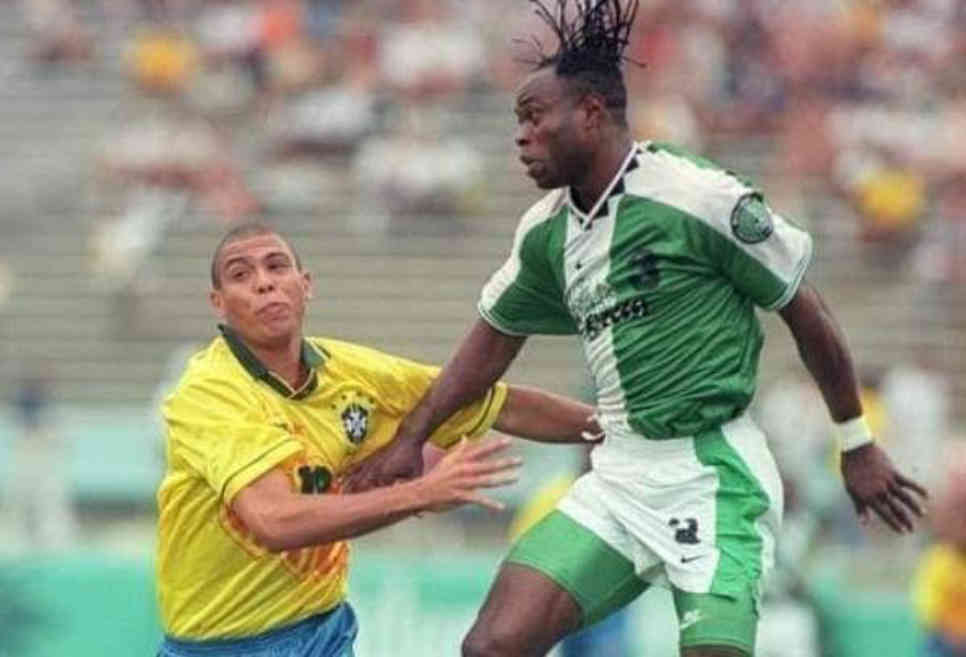
Famed as much for his colourful hairstyles as his defensive steel, Taribo West was a pillar of Nigeria’s backline during the Atlanta triumph.
His club career saw him play for top European sides including Auxerre, Inter Milan, and AC Milan, where he earned a reputation as a tough, uncompromising defender.
After hanging up his boots, Taribo embraced a new path as a Pentecostal preacher, founding the Shelter in the Storm Miracle Ministries of All Nations.
Today, he is better known as a pastor than a footballer, often delivering fiery sermons on morality and spirituality while remaining a memorable figure in Nigerian football history.
Career Highlights
| Full Name | Taribo West |
|---|---|
| Date of Birth | 26 March 1974 |
| Place of Birth | Port Harcourt, Nigeria |
| Position | Defender |
| Years | Club | Highlights |
|---|---|---|
| 1993–1997 | Auxerre (France) | Won Ligue 1 (1996), 2x Coupe de France |
| 1997–1999 | Inter Milan (Italy) | UEFA Cup winner (1998) |
| 2000–2001 | AC Milan / Derby County (loan) | Brief spells in Serie A and Premier League |
| 2001–2002 | 1. FC Kaiserslautern (Germany) | Played in Bundesliga |
| 2003–2004 | Partizan (Serbia) | Won domestic league; played UEFA Champions League |
| 2004–2005 | Al-Arabi (Qatar) / Plymouth Argyle (England) | Short stints late in career |
| Years | Team | Highlights |
|---|---|---|
| 1994–2005 | Nigeria | Olympic Gold Medal (1996) Played in 1998 & 2002 FIFA World Cups AFCON runner-up (2000), bronze (2002) |
| Honour | Year |
|---|---|
| Ligue 1 Champion (Auxerre) | 1996 |
| Coupe de France (Auxerre) | 1994, 1996 |
| UEFA Cup (Inter Milan) | 1998 |
| Olympic Gold Medal (Nigeria) | 1996 |
Social Media:
Instagram – psttaribo
Twitter/X – Taribo_West_
Sunday Oliseh
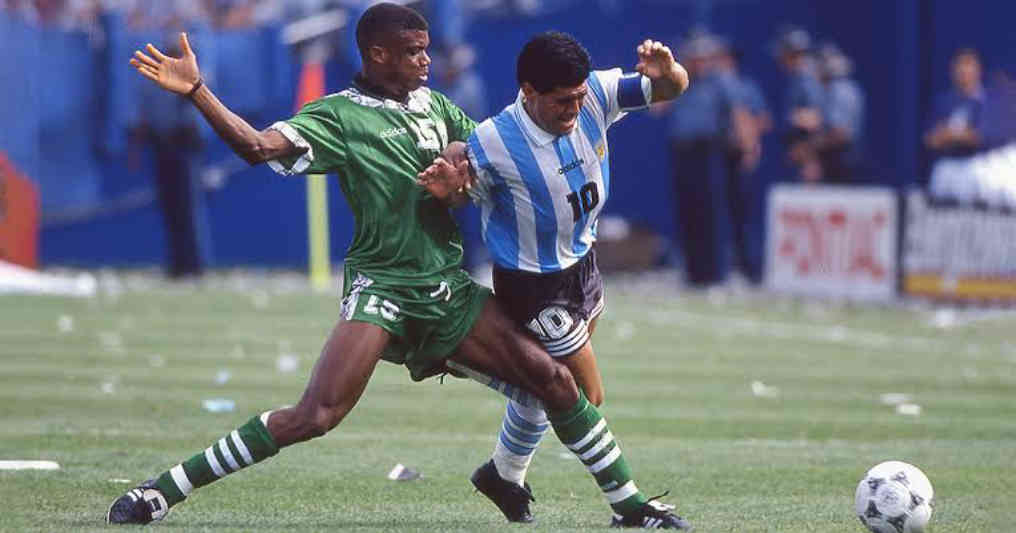
The midfield general of the Dream Team, Sunday Oliseh, brought stability, vision, and leadership to Nigeria’s triumph in Atlanta. His club career spanned elite sides such as Ajax, Borussia Dortmund, and Juventus, where his tactical intelligence and composure stood out. Renowned for his powerful long-range strikes and memorable free-kicks, Oliseh left a mark on both the Super Eagles and his European clubs.
Since retiring in 2006, he has transitioned into coaching, including a spell as manager of the Nigerian national team. Beyond the dugout, Oliseh serves as a respected football pundit in Belgium and is a member of FIFA’s Technical Study Group, shaping the global conversation on football.
Career Highlights
| Full Name | Sunday Ogochukwu Oliseh |
|---|---|
| Date of Birth | 14 September 1974 |
| Place of Birth | Abavo, Nigeria |
| Position | Defensive Midfielder |
| Years | Club | Highlights |
|---|---|---|
| 1989–1990 | RFC Liège (Belgium) | Began professional career in Europe |
| 1994–1995 | Reggiana (Italy) | Serie A debut |
| 1995–1997 | 1. FC Köln (Germany) | Key midfielder in Bundesliga |
| 1997–1999 | Ajax (Netherlands) | Won Eredivisie (1998), KNVB Cup (1998, 1999) |
| 1999–2000 | Juventus (Italy) | Part of Serie A squad |
| 2000–2002 | Borussia Dortmund (Germany) | Won Bundesliga title (2002) |
| 2003–2004 | VfL Bochum (Germany) | Regular starter in midfield |
| 2005–2006 | Genk (Belgium) | Ended professional club career |
| Years | Team | Highlights |
|---|---|---|
| 1993–2002 | Nigeria | Africa Cup of Nations Winner (1994) Olympic Gold Medal (1996) Played in 1994 & 1998 FIFA World Cups Scored famous winning goal vs Spain (1998 World Cup) |
| Honour | Year |
|---|---|
| Africa Cup of Nations (Nigeria) | 1994 |
| Olympic Gold Medal (Nigeria U-23) | 1996 |
| Eredivisie Champion (Ajax) | 1998 |
| KNVB Cup (Ajax) | 1998, 1999 |
| Bundesliga Champion (Borussia Dortmund) | 2002 |
Social Media:
Instagram – SundayOOliseh
Twitter/X – SundayOOliseh
Daniel Amokachi
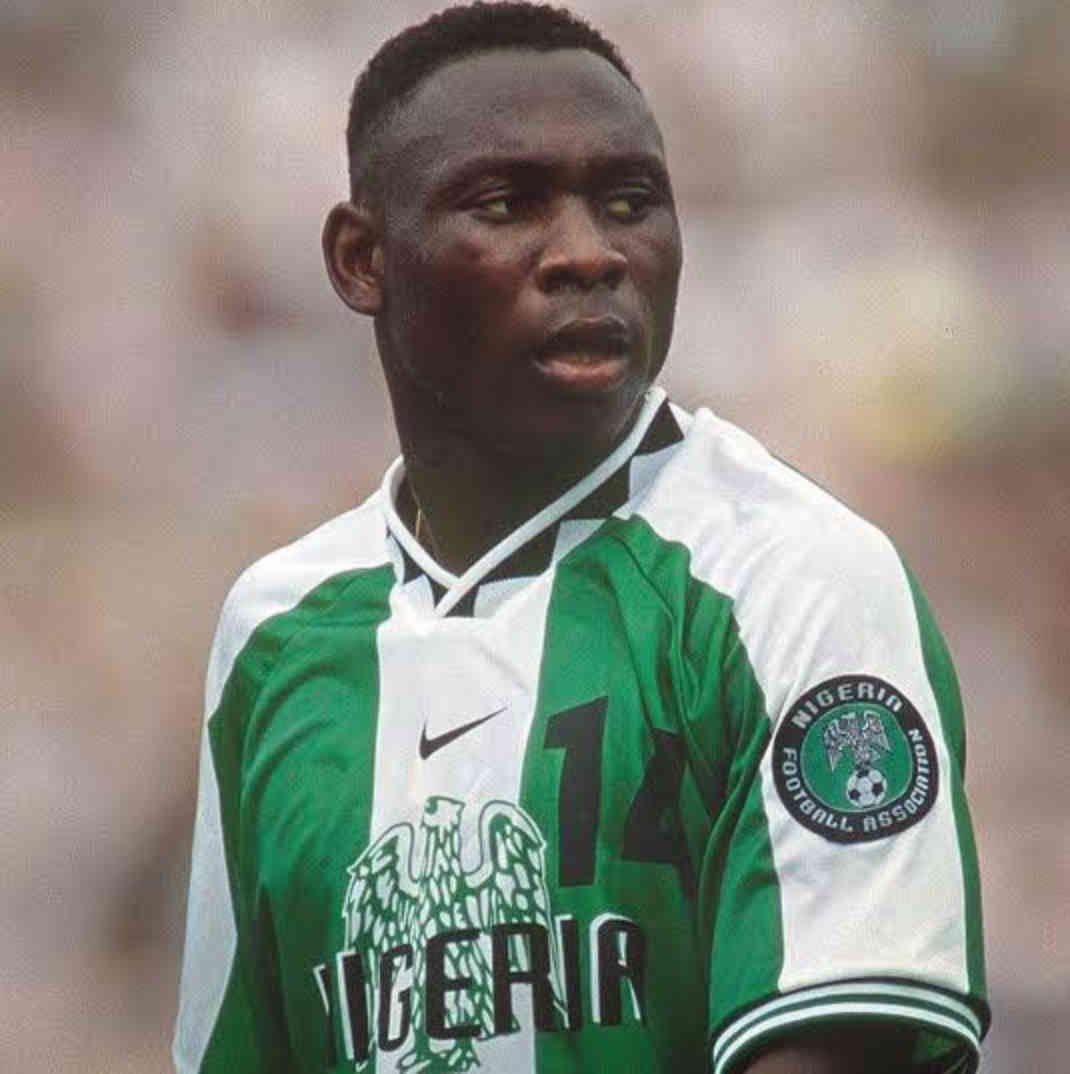
Nicknamed “The Bull,” Daniel Amokachi scored the crucial equaliser in the final against Argentina, sparking Nigeria’s famous comeback victory.
At club level, he enjoyed successful spells in Belgium, England, and Turkey, where his power, pace, and fearless style made him a nightmare for defenders.
Since hanging up his boots, Amokachi has remained deeply involved in football, coaching Nigerian clubs such as Enyimba and Nasarawa United, serving as assistant coach of the Super Eagles, and working as a respected pundit.
In 2020, he was appointed Special Assistant on Sports to President Muhammadu Buhari, a role that underscores his lasting influence on Nigerian football.
Career Highlights
| Full Name | Daniel Owefin Amokachi |
|---|---|
| Date of Birth | 30 December 1972 |
| Place of Birth | Kaduna, Nigeria |
| Position | Forward |
| Years | Club | Highlights |
|---|---|---|
| 1989–1990 | Ranchers Bees (Nigeria) | Professional debut in Nigeria |
| 1990–1994 | Club Brugge (Belgium) | 62 goals in 81 matches; Belgian Cup winner (1991) |
| 1994–1996 | Everton (England) | FA Cup winner (1995), scored twice in semifinal vs Tottenham |
| 1996–1999 | Beşiktaş (Turkey) | Won Turkish Cup (1998) |
| Later Years | Colorado Rapids (USA), Nasarawa United (Nigeria) | Short stints before retirement |
| Years | Team | Highlights |
|---|---|---|
| 1990–1999 | Nigeria | Africa Cup of Nations Winner (1994) Olympic Gold Medal (1996) Played in 1994 & 1998 FIFA World Cups Scored in Nigeria’s first ever World Cup match (1994 vs Bulgaria) |
| Honour | Year |
|---|---|
| Africa Cup of Nations (Nigeria) | 1994 |
| Olympic Gold Medal (Nigeria U-23) | 1996 |
| FA Cup (Everton) | 1995 |
| Turkish Cup (Beşiktaş) | 1998 |
| Belgian Cup (Club Brugge) | 1991 |
Social Media:
Instagram – danielamokachi
Celestine Babayaro
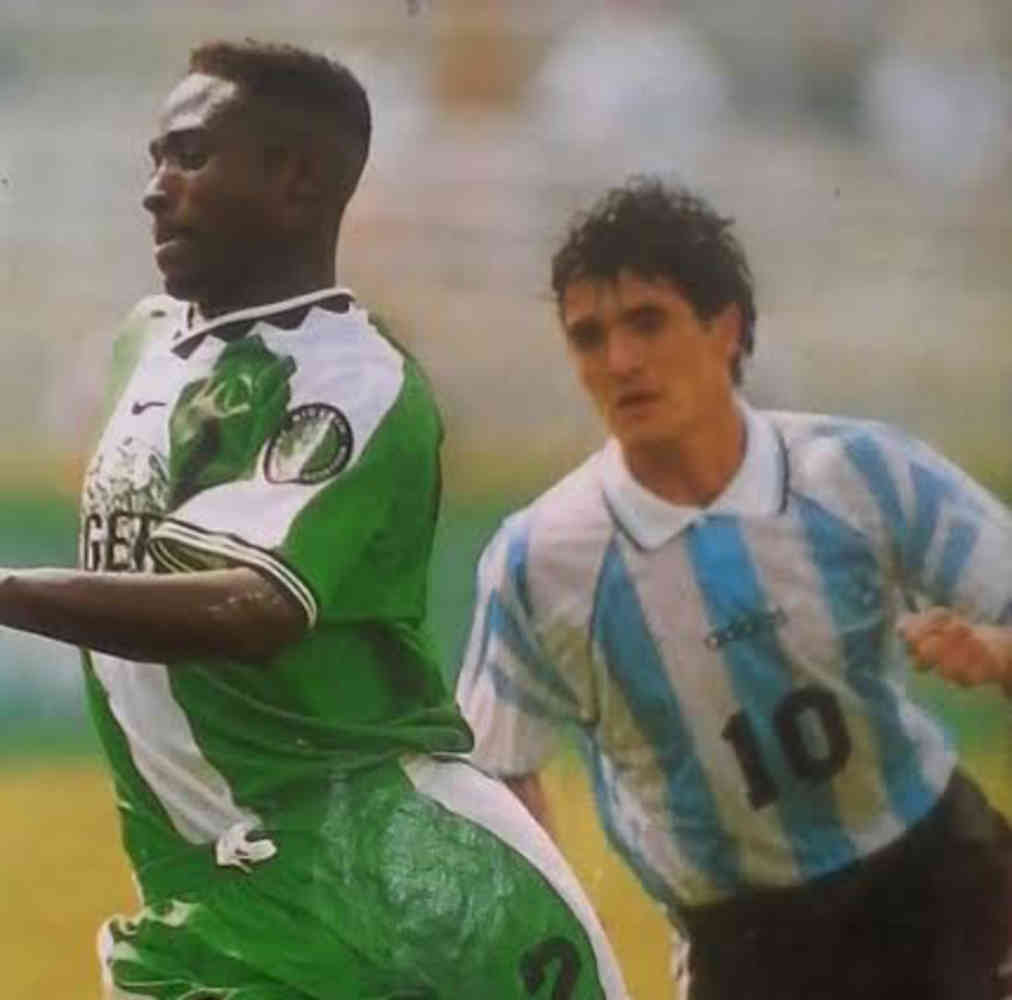
At just 18, Celestine Babayaro was the youngest member of Nigeria’s Dream Team. His standout displays in Atlanta earned him a move to Chelsea, where he became a Premier League regular and fan favourite.
He later joined Newcastle United, continuing to showcase his talent in England and in European competitions.
Babayaro retired in 2010 and has since kept a relatively low profile, making only occasional appearances at football-related events. His quiet post-career presence contrasts with the expectations many had for a player who once shone so brightly at Chelsea and on the international stage.
Career Highlights
| Full Name | Celestine Hycieth Babayaro |
|---|---|
| Date of Birth | 29 August 1978 |
| Place of Birth | Kaduna, Nigeria |
| Position | Left Back |
| Years | Club | Highlights |
|---|---|---|
| 1994–1997 | Anderlecht (Belgium) | Became youngest ever UEFA Champions League debutant (16 years old) |
| 1997–2005 | Chelsea (England) | FA Cup (2000), UEFA Cup Winners’ Cup (1998), UEFA Super Cup (1998) |
| 2005–2008 | Newcastle United (England) | Regular starter at left back |
| 2009–2010 | LA Galaxy (USA) | Played in Major League Soccer |
| Years | Team | Highlights |
|---|---|---|
| 1995–2004 | Nigeria | Olympic Gold Medal (1996) Played in 1998 FIFA World Cup Africa Cup of Nations runner-up (2000), third place (2002, 2004) |
| Honour | Year |
|---|---|
| Olympic Gold Medal (Nigeria U-23) | 1996 |
| FA Cup (Chelsea) | 2000 |
| UEFA Cup Winners’ Cup (Chelsea) | 1998 |
| UEFA Super Cup (Chelsea) | 1998 |
Social Media:
Instagram – Unknown
Twitter/X – CelestineBaba11
Garba Lawal
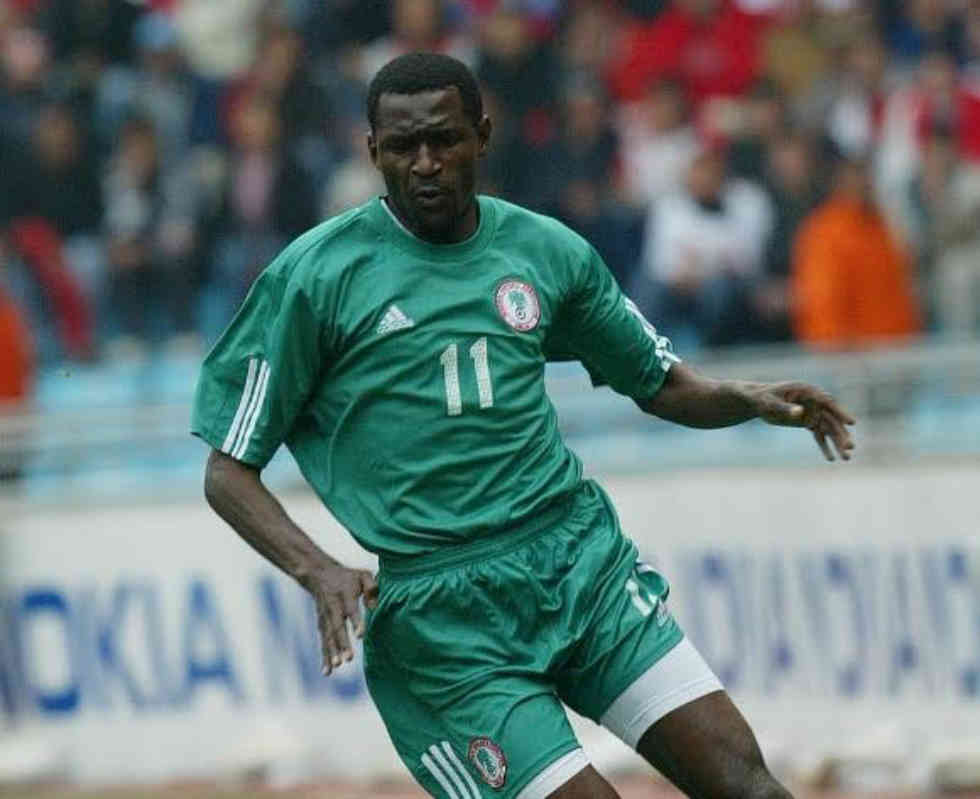
A versatile player capable of operating in multiple positions, Garba Lawal was a key figure for Nigeria during the tournament. His club career took him across Nigeria, Greece, South Africa, and Denmark.
Renowned for his consistency, Lawal remained a regular in the national team for years. After his European stints, he returned home to finish his career with Julius Berger.
Following retirement, he transitioned into football administration, serving as General Manager of Kaduna United and later working with the Nigeria Football Federation.
Career Highlights
| Full Name | Garba Lawal |
|---|---|
| Date of Birth | 22 May 1974 |
| Place of Birth | Kaduna, Nigeria |
| Position | Midfielder / Left Winger |
| Years | Club | Highlights |
|---|---|---|
| 1993–1995 | Julius Berger (Nigeria) | Started professional career |
| 1995–1996 | Tunis (Tunisia) | Brief spell in North Africa |
| 1996–2002 | Roda JC (Netherlands) | Won KNVB Cup (1997, 2000); regular starter in Eredivisie |
| 2002–2003 | Levski Sofia (Bulgaria) | Won Bulgarian Cup (2003) |
| 2004–2005 | Julius Berger (Nigeria) | Returned to Nigeria to finish career |
| Years | Team | Highlights |
|---|---|---|
| 1993–2002 | Nigeria | Olympic Gold Medal (1996) Africa Cup of Nations Winner (1994) Played at 1998 & 2002 FIFA World Cups Scored in 1998 World Cup group match vs Spain |
| Honour | Year |
|---|---|
| Olympic Gold Medal (Nigeria U-23) | 1996 |
| Africa Cup of Nations (Nigeria) | 1994 |
| KNVB Cup (Roda JC) | 1997, 2000 |
| Bulgarian Cup (Levski Sofia) | 2003 |
Social Media:
Instagram – garba_lawal_kamji
Abiodun Obafemi
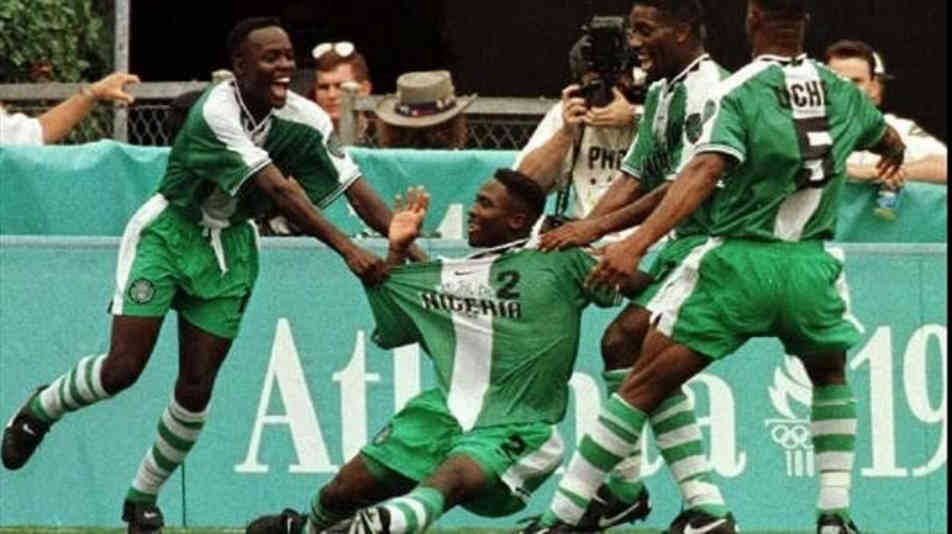
Though not as celebrated as some of his teammates, Abiodun Obafemi featured once during the tournament. He later built his career in Germany, spending several years playing club football there before moving on.
Unlike stars such as Okocha or Kanu who lit up Europe’s biggest stages, Obafemi’s career was more modest. Yet, he carved out his own path and left his mark.
Today, he runs a football academy and school in Lagos, contributing to grassroots development and nurturing the next generation of players.
Career Highlights
| Full Name | Abiodun Obafemi |
|---|---|
| Date of Birth | 25 December 1973 |
| Place of Birth | Lagos, Nigeria |
| Position | Defender |
| Years | Club | Highlights |
|---|---|---|
| 1991–1993 | Stationery Stores (Nigeria) | Started professional career |
| 1993–1995 | Fortuna Düsseldorf (Germany) | Played in Germany’s lower divisions |
| 1995–1997 | Fortuna Köln (Germany) | Established as a solid defender in 2. Bundesliga |
| 1997–1998 | SSV Reutlingen (Germany) | Continued career in German football |
| 1998–2000 | SpVgg Greuther Fürth (Germany) | Played in 2. Bundesliga |
| 2000–2002 | FC Augsburg (Germany) | Finished career in Germany |
| Years | Team | Highlights |
|---|---|---|
| 1996 | Nigeria Olympic Team | Olympic Gold Medalist (Atlanta 1996) Member of the historic “Dream Team” that beat Brazil & Argentina |
| Honour | Year |
|---|---|
| Olympic Gold Medal (Nigeria U-23) | 1996 |
Kingsley Obiekwu
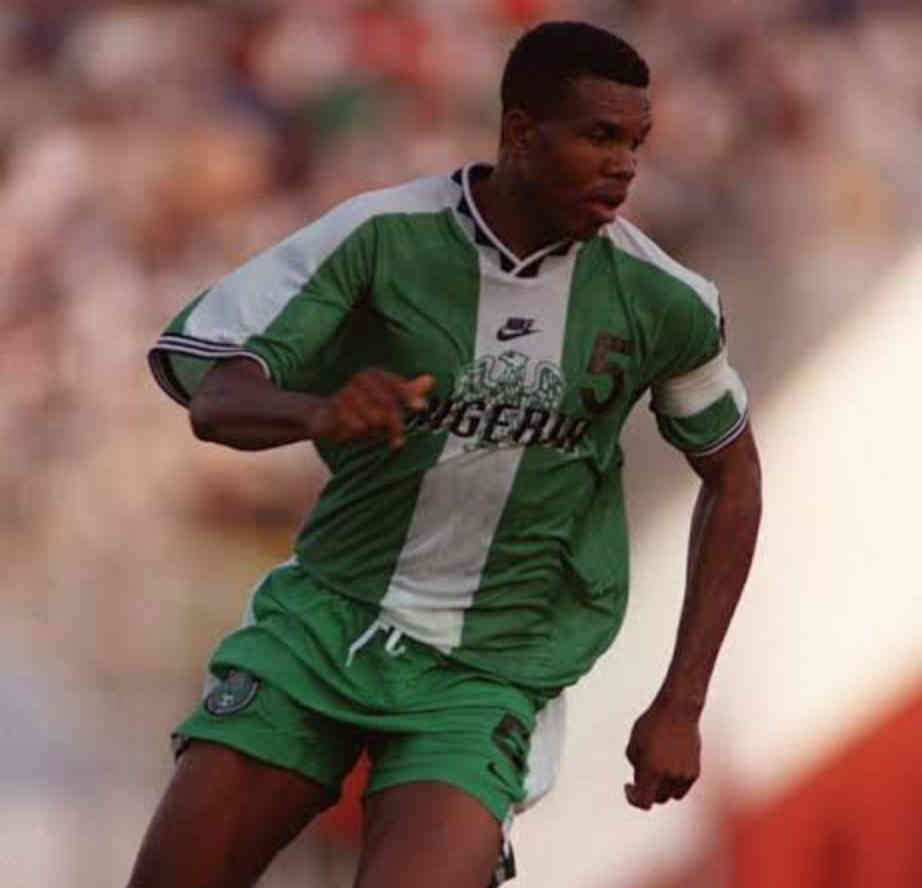
Obiekwu was part of the Atlanta ’96 squad, though he did not feature on the pitch. Still, he belonged to Nigeria’s golden generation.
Life after football brought its challenges. At one point, he resorted to driving commercial buses to make ends meet, a stark contrast to the heights of his playing days.
Despite those struggles, Obiekwu has remained connected to the game, taking up coaching roles in Nigeria and the Benin Republic. Today, he keeps a low profile, choosing to stay largely out of the media spotlight.
Career Highlights
| Full Name | Kingsley Obiekwu |
|---|---|
| Date of Birth | 12 November 1974 |
| Place of Birth | Nsukka, Nigeria |
| Position | Defender |
| Years | Club | Highlights |
|---|---|---|
| 1993–1995 | Udoji United (Nigeria) | Started professional career in Nigerian league |
| 1995–1998 | Go Ahead Eagles (Netherlands) | Played in Eredivisie and Eerste Divisie |
| 1998–2000 | Al-Masry (Egypt) | Regular in Egyptian Premier League |
| 2000–2002 | Al-Ittihad (Libya) | Won domestic titles in Libya |
| 2002–2004 | Rangers International (Nigeria) | Returned home to continue career |
| Years | Team | Highlights |
|---|---|---|
| 1995–1999 | Nigeria | Olympic Gold Medalist (1996, Atlanta) Played in the 1998 FIFA World Cup squad Appeared at Africa Cup of Nations |
| Honour | Year |
|---|---|
| Olympic Gold Medal (Nigeria U-23) | 1996 |
Legacy Of The Dream Team
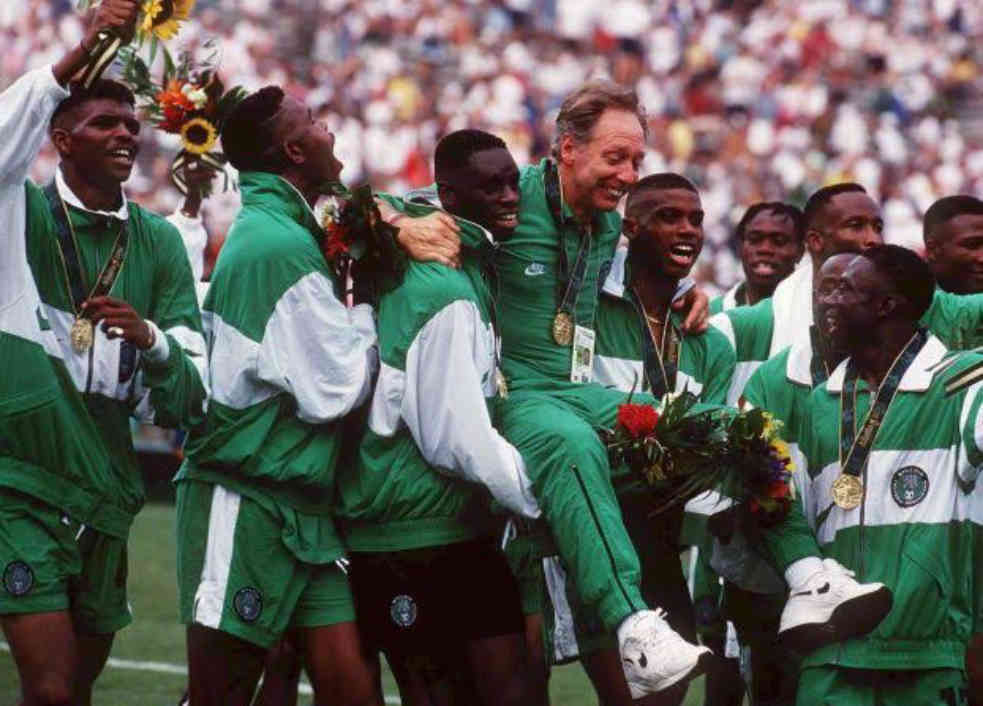
The triumph of 1996 was more than just winning gold; it reshaped global perceptions of Nigerian and African football.
The Dream Team’s success proved that African nations could not only compete with, but also defeat, the very best in the world.
Their victory lit a torch for future generations. Stars like Mikel Obi, who captained Nigeria to Olympic bronze in 2016, often recall how the 1996 team inspired them to believe and dream bigger.
Challenges After Glory
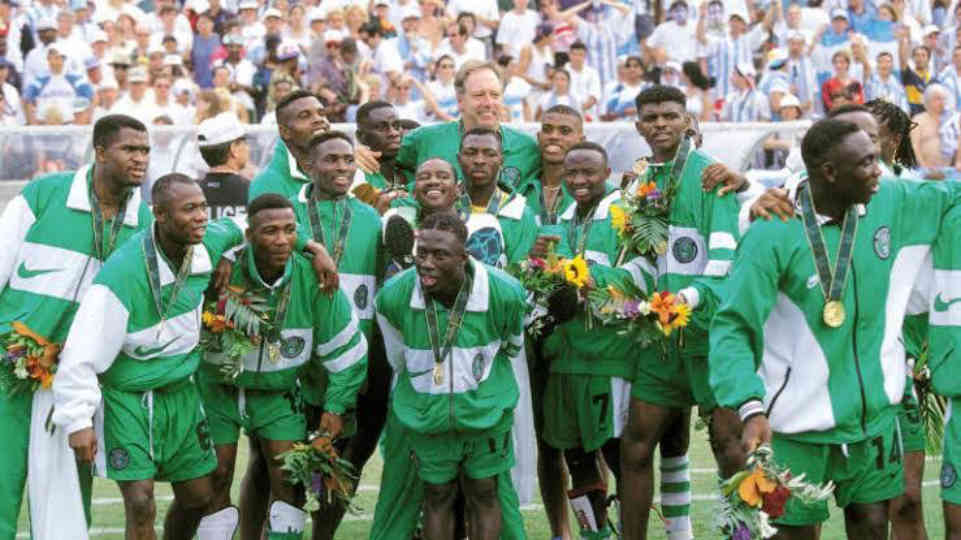
Despite their achievements, many of Nigeria’s 1996 heroes have faced challenges after retirement. Some received little or no long-term support, while others made poor investments and fell into financial hardship.
Stories like that of Kingsley Obiekwu underscore the lack of structures in place to support retired athletes in Nigeria. Yet, many others have used their fame and influence to give back to society.
From Kanu’s Heart Foundation saving lives to Chioma Ajunwa’s service in the police force and commitment to youth development, the legacies of these athletes continue to shine.
Nigeria’s 1996 Olympic triumph was more than a sporting achievement; it was a statement of possibility. Ajunwa’s historic leap and the Dream Team’s golden run in Atlanta united the nation in joy and pride.
Nearly three decades later, their stories remind us of resilience, sacrifice, and the urgent need for stronger systems to support athletes beyond their playing days.
They may have taken different paths, business, coaching, preaching, law enforcement, or even struggling to make ends meet, but together, they remain eternal symbols of Nigerian excellence.
The gold medals of 1996 were not just victories for Nigeria. They were victories for Africa, for hope, and for generations yet unborn. The achievements of Nigeria’s 1996 Olympic champions continue to inspire countless young athletes to dream, to believe, and to pursue greatness.

